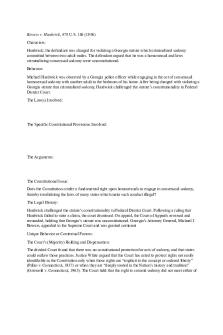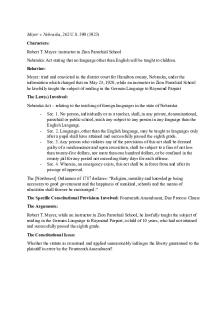Hanna v. Plumer - Case Notes PDF

| Title | Hanna v. Plumer - Case Notes |
|---|---|
| Author | Dani Merlo |
| Course | Civil Procedure |
| Institution | Indiana University - Purdue University Indianapolis |
| Pages | 3 |
| File Size | 74.2 KB |
| File Type | |
| Total Downloads | 52 |
| Total Views | 213 |
Summary
Case Notes...
Description
CIV PRO I Hanna v. Plumer United States Supreme Court 380 U.S. 460 (1965) Rule of Law If a plaintiff serves a defendant properly under the federal rules, the plaintiff can proceed with a state-law claim that requires a different method of service for establishing liability. Facts Two drivers crashed cars. Hanna (plaintiff) survived, but the negligent driver died. Hanna filed a lawsuit in federal court, based on diversity jurisdiction, against the other driver’s estate. As required under the Federal Rules of Civil Procedure, Hanna served a summons and complaint on the executor of the estate, Plumer (defendant). But Plumer was away from home, so the process-server handed the paperwork to Plumer’s wife. That approach was perfectly fine under the federal rules. But Hanna did not know that a substantive statute under Massachusetts estate laws provided that executors could not be liable unless they were served with court papers personally. Plumer moved for summary judgment. He admitted that the service satisfied the federal rules but raised the affirmative defense created by the Massachusetts statute, noting that he had not been served personally. Thus, Hanna’s service of process satisfied the federal procedural rules, but prevented the estate from being liable under Massachusetts’s substantive law. The district court judge dismissed the case. The First Circuit affirmed, and the United States Supreme Court granted certiorari. Issue If a plaintiff serves a defendant properly under the federal rules, can the plaintiff proceed with a state-law claim that requires a different method of service for establishing liability? Holding and Reasoning (Warren, J.) Yes. If a plaintiff serves a defendant properly under the federal rules, the plaintiff can proceed with a state-law claim that requires a different method of service for establishing liability. Fulfilling the federal standard for service of process suffices to allow a federal diversity lawsuit to proceed, even if that requires disregarding a state substantive law. In this case, the tension between the federal rule and the Massachusetts statute lies within an uncertain area between substance and procedure. On the one hand, the federal rule governs service in federal court. On the other hand, Massachusetts passed a substantive statute providing that estates cannot be liable unless the executor was served personally. In a diversity-jurisdiction case, a federal rule must win if it collides with a state statute. The Federal Rules of Civil Procedure seek to create a uniform method for service of process in all diversity-jurisdiction cases. Federal Rule of Civil Procedure 1 states that the federal rules apply to nearly all civil cases. Such uniformity is lawful. Congress authorized the creation of the federal rules in the Rules Enabling Act. That statute gave the Supreme Court the power to set the practices and procedures of federal district courts. By announcing the Federal Rules of Civil Procedure, the Supreme Court had exercised that power faithfully. The rules are meant to be uniform, and that intention comports with the grant of power Congress bestowed on the Supreme Court. Plumer’s argument that doctrine articulated in Erie Railroad Co. v. Tompkins, 304 U.S. 64 (1938) requires enforcing the Massachusetts statute is rejected. The Massachusetts law is not a mere court rule, but a
CIV PRO I substantive statute about how executors and estates can be held liable. Erie requires applying state substantive law in diversity cases, but Erie was chiefly intended to prevent same-state forum shopping. In this case, however, the disputed Massachusetts statute does not create any major risk of forum shopping. If the suit were in state court, Hanna could have easily served process on Plumer, as required under Massachusetts law. Also, serving Plumer’s wife was reasonable, and hardly a reason to allow the allegedly negligent driver’s estate to avoid liability. Finally, Erie has never been applied to void a federal rule. This weakens the Erie doctrine: in a conflict between a federal rule and a state statute, the federal rule wins. The judgment of the court of appeals is reversed, allowing Hanna to go ahead with her lawsuit. Concurrence (Harlan, J.) Erie reflects a deep respect for state laws, and does not just deter forum shopping. While the outcome is correct, the majority’s test might doom some important state statutes to save irrelevant federal procedural rules. [NOTES START] - FRCP 4—Able to leave it at the home of the administrator - State Rule—Must serve executor in hand (in-hand SOP) o In hand serviceensure they will get notice and pay on time - P files in federal court, leave it at D’s house, and the statute of limitations runs out and D says they didn’t serve me in hand as required by MA law (P is now completely out of luck) - Federal Trial court agrees with the D - They follow the rule of York outcome determinative rule o Lower Courts said this was outcome determinative - If there is a difference in the outcome b/w federal law and state law you MUST follow the state law to eliminate forum shopping - SCOTUS says they are going to change the meaning of “outcome determinative” o Announce a new approach to the outcome determinative test o They are changing the meaning of the term and saying to not take it too literally o Court is saying in general, anything can be outcome determinative In general among all P there would be a tendency for plaintiffs to say they were going to federal court Court is only saying this in dicta and backing off of the outcome determinative test in York Court say they are not using the outcome determinative test in Bryd or Hanna - What does the Court say about this case? o FRCP over state court statute o Bryd case said the procedures of FRCP and state should be weight o In this case they say NO federal courts can create their own rules o Bryd does the weight BUT when you have a federal rule congress has the power to promulgate rule and nothing in diversity should take away from that
CIV PRO I
-
-
REA gives them the power to do that and should be interpreted as complementing each other In this case the federal rules themselves were passed by a federal statute o Whenever you have FRCP that flows from the REA o Federal rules are valid as long as you don’t mess around with state’s substantial rights This is preserving the RDA Bottom line o Justice Warrens rule if you have FRCP follow that o Hannah is a case that tried to give lawyers clarity o Justice Warren’s opinion is a bright like rule Redefining outcome determinative test AND Brightline rule—follow the FRCP rule as long as it is not modifying any state’s substantive rights Justice Harlan’s opinion o He concurs o May not be about outcome determinative; his opinion is closer to Bryd o He wants to be faithful to federalism o State laws can be passed for certain important reasons o Want to leave primary rules of conduct to the state o Requiring in hand ensuring they can make it by a certain date o Agrees with the outcome BUT sees this as closer to Bryd o With the weighing and federalism
[NOTES END]...
Similar Free PDFs

Hanna v. Plumer - Case Notes
- 3 Pages

Harris v. Balk - Case Notes
- 2 Pages

Jones v Padavatton - case notes
- 1 Pages

Hamilton v Nuroof - case notes
- 4 Pages

Hanna arendt
- 2 Pages

R V Hutty case notes
- 5 Pages

Royall v The Queen case notes
- 41 Pages

Mathe lk Alexandra Hanna
- 42 Pages
Popular Institutions
- Tinajero National High School - Annex
- Politeknik Caltex Riau
- Yokohama City University
- SGT University
- University of Al-Qadisiyah
- Divine Word College of Vigan
- Techniek College Rotterdam
- Universidade de Santiago
- Universiti Teknologi MARA Cawangan Johor Kampus Pasir Gudang
- Poltekkes Kemenkes Yogyakarta
- Baguio City National High School
- Colegio san marcos
- preparatoria uno
- Centro de Bachillerato Tecnológico Industrial y de Servicios No. 107
- Dalian Maritime University
- Quang Trung Secondary School
- Colegio Tecnológico en Informática
- Corporación Regional de Educación Superior
- Grupo CEDVA
- Dar Al Uloom University
- Centro de Estudios Preuniversitarios de la Universidad Nacional de Ingeniería
- 上智大学
- Aakash International School, Nuna Majara
- San Felipe Neri Catholic School
- Kang Chiao International School - New Taipei City
- Misamis Occidental National High School
- Institución Educativa Escuela Normal Juan Ladrilleros
- Kolehiyo ng Pantukan
- Batanes State College
- Instituto Continental
- Sekolah Menengah Kejuruan Kesehatan Kaltara (Tarakan)
- Colegio de La Inmaculada Concepcion - Cebu







